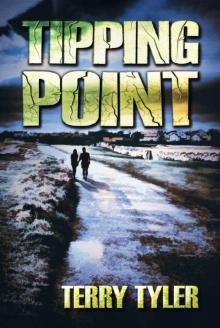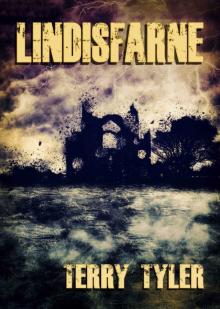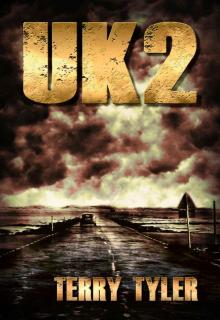- Home
- Terry Tyler
Megacity: Operation Galton Book 3 Page 6
Megacity: Operation Galton Book 3 Read online
Page 6
Away from his mates, and a system he understood. Away from everything he knew.
During the journey he ignored Clay's chatter about Hope 23 having a governor who was more 'active' in the running of the place. Must be one of the Villages for troublemakers then, which he'd heard were more like prisons. Well, fuck them. If they wanted to treat him like a criminal, he wasn't about to disappoint.
The three-month stay in Shelby Open was punishment for a fight with an arsewipe red cap who'd got too handy with his taser on Jayden's girlfriend. Deserved every punch of the beating he received.
"I'm betting adult jail was an eye-opener, wasn't it?" Clay shuddered. "You must be glad to be out of there!"
Radar stared at the rain splattering against the pod window, and said nothing.
"Did it give you time to think? Come on, mate, you're a bright guy. You don't want to be in and out of trouble all your life, do you?"
A bright guy. Patronising fuck. Radar turned to look at Clay's stupid grin above his immaculately trimmed black beard. He fiddled with his eternity bracelet, a present from his husband.
"So if I don't, what then?" Speech felt awkward, like a skill he'd allowed to become rusty. He'd talked as little as possible in Shelby, where most inmates fell into two groups: scared losers, or cocky wankers who boasted of their crimes. On the first day, an older guy who worked in the kitchen garden said, "Don't get involved in gangs, groups and politics in here. Just put your head down and do your time." Radar took his advice.
Clay smiled. "What do you mean?"
"You said I didn't want to be in and out of trouble all my life. So if I decide to be a good boy, what's on offer?"
The bracelet fiddling increased. "Well, you could study, take up a new interest―"
"Yeah? Okay, say I study and get a qualification, will I get a flat and a job in the megacity? The chance to live my life as I want, with my own front door? My own bedroom, instead of a bunk in a dormitory with some arsehole farting and snoring in the bed above? A bit of fucking privacy, to be treated like a human being? No, don't answer. 'Cause you know as well as I do, that once you're in Hope, you're in Hope. Unless some rich fucker decides they want to adopt you, and I think that window closed for me at least ten years ago."
Clay gave him that caring, empathetic smile that the red caps must surely practise in a mirror on their training courses, because they all did it, exactly the same.
"I'm talking about you." He patted his fist on his chest. "What's in here. The sense of achievement you'd get from knowing you've put your brain to good use, learned a skill. Hell, one young woman I know of in Hope 32 is writing a novel. Her educational motivator is going to help her to publish, and who knows? Once it's out there, if it's successful, she could very easily be granted a place in a megacity. Once she's proved she can support herself―the sky's the limit, mate."
Radar just laughed, shook his head and turned back to the window. He'd known inmates in Hope 44 who'd had dreams of entrancing millions with their words, their music, their art, and becoming financially independent. Them and ten thousand others.
"It's about living your best life," Clay continued. "Don't let the bastards get you down, eh?" Here he gave Radar a chummy punch on the arm. "I get it, you want to punch the bejaysus out of the stork that dropped you where he did, but if you allow yourself to fall into that cycle of resentment, offending, getting out, reoffending, you're never going to find peace of mind."
That bit was true, but Radar didn't need this privileged wanker pointing it out to him.
"What the hell would you know about anything?"
"Sorry?"
"Where do you live?"
Still that fake smile. "Is that relevant?"
"Yeah, it is." Radar nodded, to himself. "It's not a difficult question. Where do you live? What job did your dad do? What exams you got? Or aren't you allowed to tell me?"
"Strictly speaking, no, but I'll make an exception." Clay looked up, biting his lip, as if he was having to think about it. "I live in MC13, with my husband, Maurice. I was born in the old town of Market Harborough, and moved to MC13 when I was fourteen, with my parents who are both data analysts, and my elder sister, now a doctor. I went to uni in MC1, and got a 2.1 in Social Care. Been working in Hopes since I graduated."
"I rest my friggin' case," Radar muttered, and turned back to the window.
They thought that the adult prison would sort him out, make him kowtow because he'd be scared of going back, but they were wrong. He would keep out of prison, but on his own terms. He would work smarter, craftier, network with the right people.
The eighteen-year-old Radar was five feet eleven inches tall, and weighed fourteen stone of solid muscle. In Shelby he'd spent every moment he could in the gym, and put himself through a programme of press-ups, stomach crunches, squats and kick-boxing moves when locked in his cell. His life was only just beginning; he wasn't going to spend it in a Hope Village, but he didn't fancy the Wasteland, either. He liked to watch TV, have hot showers. No way was he going to live with a load of hippie renegades, eating fucking home-grown spuds and burying his shit in the garden.
Something had to happen. It had to. Because life changed, all the time. You never knew what was round the corner. And he certainly wasn't spending years studying for some shitty qualification that would be of no use whatsoever.
He opened the door of Hope 23's community lounge and stood on the threshold, taking it all in. Ah, yeah. That was what he was looking for. Over in one corner, a few hard nuts played pool. Same as Hope 44, then; the pool table in the far corner was the domain of the strongest gang. He studied them. One fella had an air about him, that air of being in charge. Not the tallest, or the broadest. Just something about him. Shaved head, goatee beard, tattooed arms. He wore a black singlet, even though the comm lounge was not as warm as it might be.
Radar didn't hesitate. He walked straight over; as he did so, the fella looked up.
Radar held his hand out and said, "I just arrived. Can you tell me who's in charge around here?"
"That'll be me." The man held out his hand in response; they shook. "Sid. You wanna game?"
In the disused classroom that the crew used for their meetings, Sid slung his arm around Radar's shoulder, and gave it a friendly pat.
"You recognised us as soon as you walked in the door―recognised me―and I like that. We all like that, don't we, lads?"
"We do," said a tall, skinny fella with greasy hair. The others nodded, and murmured their approval.
"Y' coulda hung back, hedged y' bets, but you read the room. So that's given you an in. But I need a crew around me I know I can trust, know what I mean?"
"I do."
Sid removed his arm, and sat back on the edge of one of the tables. "Anyone who wants to join my crew has to prove hisself. You've all done it, haven't you, lads?"
"We have," said a short, fat guy with a black Mohawk. Radar guessed they were aged from about eighteen to late twenties, possibly thirty; they had the same aura as prison inmates. Yeah, this place was a whole different ball game from Hope 44.
"That's cool," said Radar. "What d'you want me to do?"
Sid glanced at a few of his gang, then observed Radar with narrowed eyes. "There's this red cap. Right little fucking Hitler."
"Only gets up in the mornings to make our lives as hard as possible," said Mohawk.
"What's his name?"
"Nathan. Specky twat, face like a weasel. Jizzes over the rule book every night 'fore he goes to sleep."
They chortled at this.
"Last week, Brett here—" Sid pointed at a brick shit-house of a guy "—his uncle came to see him, first time for a year, 'cause he was going to let Brett sleep on his couch and get him taken on in his warehouse. Like, a proper life. But Brett had a bit of a set-to with Nathan in the canteen, 'cause the twat said he couldn't have another helping of chips. Had him chucked in the box, there and then, so Brett never got to see his uncle. Not only that, but the fucker went and told
the uncle what happened. Made it sound worse than it was; it weren't even a scrap, just, like, a bit of shouting, but after that the uncle decided he didn't want to help Brett out after all."
"Y'shoulda seen the little shit's grinning face when he told me," Brett said. "Said he'd done my uncle a favour."
"He knew about him coming," added the tall, skinny, greasy one. "Wound Brett up on purpose, just so's he could put him in the box."
Radar nodded. "I get it. What's the plan, then?"
Sid didn't answer for a moment; his eyes bored into Radar's. The others remained completely silent.
"We want him gone."
Radar felt his throat constrict, but did his best not to react. "Like, gone gone?"
Sid nodded.
Brett said, "He's took my life away. My chance at, like, a real life."
Radar felt all eyes on him.
"Okay." His mind whizzed forward. "You'll have to give me a few days to suss it out. And best if I don't hang with you lot until a couple of weeks after it's done, so nobody thinks you put me up to it."
"Good thinking." Sid's mean mouth curved into a smile. "I think you and me are going to get on."
The best time was at the end of his shift, Radar was told. Nathan spent ages in the staff locker room, getting kitted out in his cycling gear to ride home.
"Don't you worry about getting in, I'll take care of that," Sid assured him. "He ain't popular with his crew, neither, 'cause he snitches on 'em."
"Do they know what's going to happen?"
"Do they fuck. They just think he's getting a bit of a kicking."
Sure as Sid had promised, the facial recognition mechanism on the staff-only door had been temporarily switched off, as had the cameras, and the door was unlocked. The two guards Radar encountered on his way to the changing room looked the other way.
It was, as Sid had promised, a piece of piss.
Radar had not yet seen this Nathan around Hope 23. He knew he was around five feet nine, skinny, with legs like long pieces of string. Brown hair parted in the middle. Radar doubted that lot knew what a weasel looked like, though; they were sweet and pretty.
He entered the changing room, and there he was, kicking off his work trousers before folding them neatly and hanging them in his locker. Out came a pair of cycling leggings; Nathan held them up, as if appraising their suitability, before preparing to step into them. His helmet was on the bench, ready to be donned when dressed in his full apparel.
This was the moment. When he was at his weakest. Bent over, pulling on the leggings.
This was the moment his life would end.
Radar felt consumed by a sense of darkness. This fella must have parents. Siblings. He had a life in front of him. One day he might get married, have children.
Children he would teach to be just like him. Little Hitler jobsworths, hell-bent on making the lives of the unfortunate as miserable as they could.
But taking someone's life―
If you don't do this, you'll have no gang allegiance. Sid's crew will reject you, and nobody else will touch you. You'll be the brawny chicken-shit who talks the talk but can't walk the fucking walk. Worse, Sid might order a hit on you. After all the trouble he's been to, to organise this. Must have cost him, too.
Radar was not getting out of here any time soon, and he needed to protect himself. Think of his own life. Survival. That was all that mattered.
He walked forward, the murder weapon in his hands, wound around each glove-covered palm. Two pieces of fabric, tightly knotted in the middle. Pulled taut around the neck, the pressure of the knot would crush the larynx, thus hastening the strangulation process. According to Sid.
Nathan gave a desperate gasp as the garotte was slipped over his head and around his neck. Radar pressed his forehead against the back of Nathan’s head; Nathan pulled at the fabric with weak, useless fingers, socks skidding on the shiny, polished blue floor. The only sounds in the room were his desperate last breaths, and the soft thud of his kicking feet.
For a moment, Radar felt as though they were one; his forehead was pressed so hard onto the back of the young man’s head that he could hear the trauma taking place within. The crunching of bones. The frantic attempt to swallow, breathe, cry out.
Eight or ten seconds, that was all it took to end his life. The mass of bones, blood, organs and flesh that was once a person called Nathan went limp, and fell to the floor. Radar's heart thudded, his brain dizzy with adrenaline and fear, but he remembered what Sid had told him.
"Check his pulse. Neck and wrist. Put y' hand on his heart. Open his mouth and make sure he ain't breathing. Gotta make absolutely fuckin' sure he ain't still alive, 'cause if he lives to tell the tale you'll be locked up till you're too old to care. Then smash his head on summat so it looks like he fell over an' bashed it hisself."
Radar did as instructed.
He untied the two pieces of cloth, flushed them down the toilet and walked out, past the guards, back to the safety of the inmates' corridor. As he headed towards the comm lounge to deliver the good news, his heart rate returned to normal.
Fucking hell, though. He'd just killed a man.
A few months later, after extensive investigation failed to reveal who had been in the changing room with Nathan, the insertion of tracking chips in Hope residents' arms was introduced.
Chapter 7
Aileen
2048 ~ 2051
The moment Leah was taken out of my arms was the most painful of my entire life. I cried all the way home. I didn't stop for the rest of the day; I was empty, lost.
Not having to tiptoe around Eric's moods was actually a relief, but without Leah, the flat felt like the loneliest place in the world. I had a hollow ache down the front of my body, permanently.
Worst of all, I discovered that the 'regular' in 'visits on a regular basis at NPU's discretion' was a relative term. The key phrase being 'at NPU's discretion'.
When someone soothes your distress by saying 'I promise, you'll have regular visits, you'll see her again very soon', you tend to believe them, but 'very soon' is a relative term, too.
Jennifer, the supervisor for the under-fives, was so nice, and I assumed I could look forward to a long visit at the weekend, and every one thereafter; I'd already decided that as soon as she was old enough to understand, I would tell her that I was working away.
That was my plan. But now I was told that I couldn't see her for two whole months.
"This period of adjustment will allow Leah to settle in," Jennifer explained. "Our transferral of care agreement—that you signed—is standard, but visitation regularity can vary, and it does say 'at our discretion'. If she was older it would be a different matter, but Leah is too young to understand what's happening; if you're here one day and gone the next, week in, week out, she will experience abandonment every time you leave. These initial two months will allow her to bond with her primary carer, for maximum emotional stability."
I went berserk when I discovered this. Seriously. They called security, two quietly authoritative types who placed firm hands on my arms and requested that I calm down. Portia French and Jennifer ushered me into a 'day room', with comfortable sofas and tissues. Portia told me to sit down, gave me water—I needed brandy—and said, "You want Leah to feel happy and secure, don't you?"
"Of course I do."
Her eyes told Jennifer to leave. "Aileen, when a woman has lost her partner―"
"Husband. Eric is my husband, not my partner. My husband, and Leah's father."
"Yet he's chosen to walk away from both roles, hasn't he? We do understand what a challenging time this is for you, but as I was saying, when a woman has lost her partner she may cling to her offspring, which is unhealthy for both child and parent."
"I'm not clinging to her—what the hell do you mean?"
"Aileen, at the moment you can't provide a home for Leah, so at your behest, NPU has taken over that role, which means that Jennifer has become the decision maker on issues pertaini
ng to her welfare. You read this, didn't you? In the literature I sent?"
"Yes, but it also said you would work with me to settle on the best schedule for all concerned."
"And that's what we're doing—everything we can to ensure that Leah remains happy, healthy and emotionally secure. But it's likely she will be with us for a good few months, at the very least, and right now I need you to accept that NPU is not day care. It's non-parental upbringing, which is quite different; you do understand that, don't you? Aileen?"
I nodded numbly.
"Meanwhile," she continued, "I'm here to give you a helping hand to get back on your feet. I've booked you onto an evening course―free of charge―to get you up to speed with the latest tech. I've also found you a job; I'm afraid it's only F grade, as an auxiliary at Barrington House, which is a care home for the elderly and infirm in Senior Village―"
"F grade? But that's no good―I need at least D grade to keep this flat on―I’ve got to have two bedrooms―"
"It's all I could get for you right now, and you'll be able to live in―the staff quarters are very pleasant. Come on, buck up; at least you'll be earning. It's a foot back on the ladder. And once you've done your course, you'll be able to apply for D grade."
"Thank you." She was right, of course. It would be a long haul, but yes, it was a start. The first step on the road back. My heartbreak over losing Leah had stopped me seeing that perhaps she really was trying to help. "I appreciate it. I do, really. When do I start?"
"On Monday. The removal van will come on Sunday; I've sent all the details to your com, along with everything you need to know about the course, which starts next week." She patted my knee, which made me flinch. "The only way is up!"
I was the lowest of the low. I did laundry, I cleared up meals, and sometimes got to sit down and have a cup of tea with the residents. Being physically active instead of sitting in front of a screen all day suited me, and I liked talking to the old people about life in the twentieth century, which sounded wonderful, carefree.

 Megacity: Operation Galton Book 3
Megacity: Operation Galton Book 3 Last Child
Last Child Hope
Hope Dream On
Dream On Tipping Point (Project Renova Book 1)
Tipping Point (Project Renova Book 1) Wasteland
Wasteland Blackthorn
Blackthorn Lindisfarne (Project Renova Book 2)
Lindisfarne (Project Renova Book 2) UK2
UK2